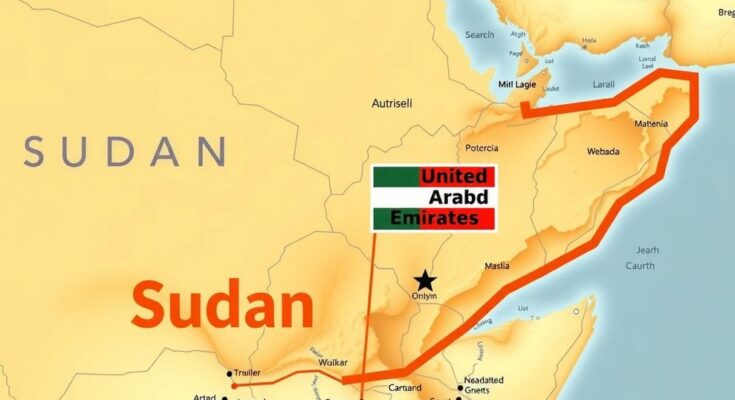The UAE has been accused by Sudan of complicity in genocide amid the civil conflict involving the RSF and the army. The UAE is reportedly supporting the RSF while denying these allegations. Sudan’s rich natural resources are of interest to the UAE, which seeks political influence and economic opportunities in the region. The impending ICJ case may impact the UAE’s international reputation.
The ongoing conflict in Sudan has drawn accusations against the United Arab Emirates (UAE) regarding its involvement in alleged genocidal activities, leading to a case being filed at the International Court of Justice (ICJ). Sudanese officials claim that the UAE has provided support to the Rapid Support Forces (RSF) in their prolonged conflict with the regular army, an allegation that the UAE firmly denies.
Sudan’s natural wealth, including substantial agricultural land, gas, and gold resources, attracts international interest. The UAE’s involvement is linked to its ambitions to secure political influence and commercial opportunities within this strategically significant nation. Additionally, with Sudan sharing borders with Libya, where the UAE supports rebel factions, and possessing access to the Red Sea, the region’s geopolitical dynamics further enhance the UAE’s interest.
The power struggle within Sudan escalated in 2021 when military leaders, including army chief Abdel Fattah al-Burhan and RSF commander Mohamed Hamdan Daglo, known as Hemeti, clashed in an internal conflict. Analysts suggest external powers, including the UAE, may be backing opposing sides in this power struggle, indicating a complex geopolitical context behind the conflict.
Andreas Krieg, an expert from King’s College London, noted that the UAE’s primary objective revolves around establishing political influence in Sudan, a country vital for its geographical positioning and resources. Hamid Khalafallah, a Sudan researcher, highlighted the UAE’s pursuit of essential resources it lacks, such as minerals and agricultural land, while observing a consistent pattern of Emirati involvement with paramilitary groups across the African continent.
The UAE plays a pivotal role in the gold trade, being the largest importer of Sudanese gold, which is reportedly controlled by Daglo. However, Professor Federico Donelli argued that the UAE’s interests extend beyond gold, as it seeks to counterbalance Saudi influence within Sudan and mitigate the risks associated with political Islam.
Historically, ties between the UAE and Sudan’s military were strengthened by Sudan’s participation in the Saudi-led coalition during the Yemeni civil war. However, rifts have emerged between the UAE and Saudi Arabia, with the UAE’s alleged backing of Daglo seen as a challenge to Saudi interests. Furthermore, the ideological alignment of the RSF against the Muslim Brotherhood contrasts with the Sudanese army’s associations with former Islamist regimes, highlighting the complexity of alliances.
Despite claims from both sides regarding possible war crimes amid extensive human suffering, recent accusations of genocide have been directed toward the RSF by the United States. In January, US lawmakers also indicated that the UAE had failed to fulfill promises to cease military support for the RSF, leading to growing concerns about the UAE’s involvement.
The legal proceedings at the ICJ reflect increasing discomfort with the UAE’s perceived destabilizing role, though the UAE dismisses the allegations and intends to challenge the case’s validity. While ICJ rulings are legally binding, they lack enforcement power, suggesting that the UAE might experience limited repercussions despite potential reputational damage on an international scale.
In summary, the UAE’s involvement in Sudan reflects a complex interplay of political, economic, and ideological interests amidst significant regional tensions. The ongoing accusations against the UAE regarding its alleged support for the RSF and complicity in genocidal actions highlight the broader implications for international relations and stability within Sudan. Despite its dismissal of these claims, the UAE faces a potential reputational crisis through ongoing legal challenges at the ICJ and increasing global scrutiny.
Original Source: www.hindustantimes.com




